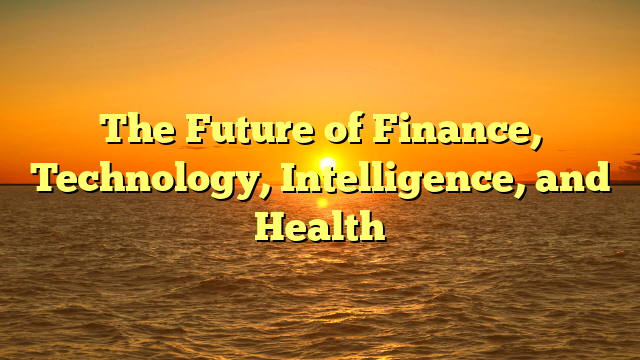
In the current age, the convergence of finance, technology, intelligence, and health is creating a new paradigm for how we live, work, and think. As we look ahead, it’s important to recognize how these domains influence each other and contribute to a more integrated world.
Finance: The Backbone of Economic Stability
At its core, finance serves as a critical element in economic development. It includes everything from loan systems to investment management, providing the tools necessary for businesses and individuals to prosper. The growing popularity of blockchain technologies and other decentralized systems is reshaping how financial transactions are conducted and opening new avenues for wealth generation.
The finance industry has undergone significant transformation, thanks to the rise of fintech. New technologies allow for greater access to financial services, such as automated portfolio management and online lending, often reducing the barriers to entry for consumers. Machine learning and AI applications are also helping banks and investors make data-driven decisions, minimizing risk and maximizing profitability.
Technology: Shaping the World of Tomorrow
Technological advancements continue to redefine our daily lives, enabling new forms of communication, work, and entertainment. The emergence of cutting-edge technologies like AI, the Internet of Things, and distributed ledger systems is not only revolutionizing how businesses operate but also the way individuals interact with their environment.
Technology is revolutionizing healthcare by enhancing diagnostic accuracy and making medical care more accessible. With the rise of AI-driven diagnostic tools and telemedicine, patients are now able to receive timely care without leaving their homes. The integration of wearables like smartwatches is also allowing for continuous health monitoring, providing valuable data for both patients and healthcare providers.
Intelligence: The Role of Artificial Intelligence in Modern Society
Artificial intelligence is at the forefront of the technological revolution. With applications in nearly every sector, AI is helping businesses and governments improve decision-making, optimize workflows, and enhance efficiency. From virtual assistants providing customer service to machine learning algorithms identifying financial risks, AI is redefining the role of humans in the workforce.
As AI continues to evolve, its role in enhancing human intelligence and problem-solving capabilities grows. In healthcare, AI is being used to predict patient outcomes and even assist in surgery through robotic technologies. In the financial sector, AI algorithms are optimizing trading strategies and minimizing risks. The widespread adoption of AI is expected to usher in a new era of productivity, efficiency, and innovation.
Health: The Integration of Technology for Better Health Outcomes
Medical advancements are pushing the boundaries of what is possible in healthcare. New technologies like minimally invasive procedures are making surgeries more precise, reducing recovery times, and improving patient satisfaction. Moreover, the integration of virtual health consultations is transforming the healthcare landscape by offering patients access to doctors without the need for in-person visits, making care more accessible and affordable.
cengli88.net is being transformed by innovations in AI, machine learning, and biotechnology. Personalized medicine, powered by AI, allows doctors to create tailored treatment plans based on an individual’s genetic profile and lifestyle factors. The use of wearable technology to track vital signs and physical activity is helping individuals manage their health better, and AI tools are making it easier for medical professionals to diagnose and treat conditions more effectively.
Conclusion: Towards an Integrated Future of Finance, Technology, Intelligence, and Health
Looking ahead, the convergence of finance, technology, intelligence, and health presents immense opportunities. By leveraging technological advancements, we can improve financial systems, optimize healthcare, and expand the capabilities of artificial intelligence. However, it’s essential to remain vigilant about the challenges these technologies may pose and work toward solutions that ensure equitable benefits for everyone.
In conclusion, understanding the dynamics between these sectors and their future implications will be key to navigating a rapidly changing world. Whether it’s through improved health outcomes, smarter financial management, or more advanced technology, the continued collaboration of these fields promises to create a brighter and more sustainable future for all.





